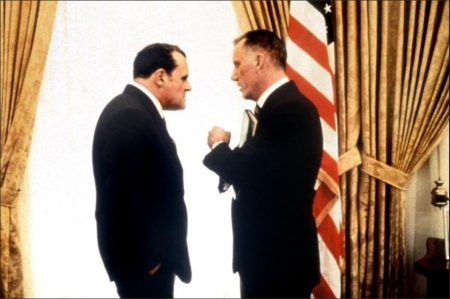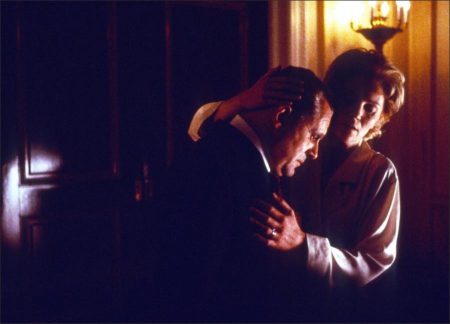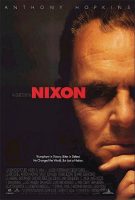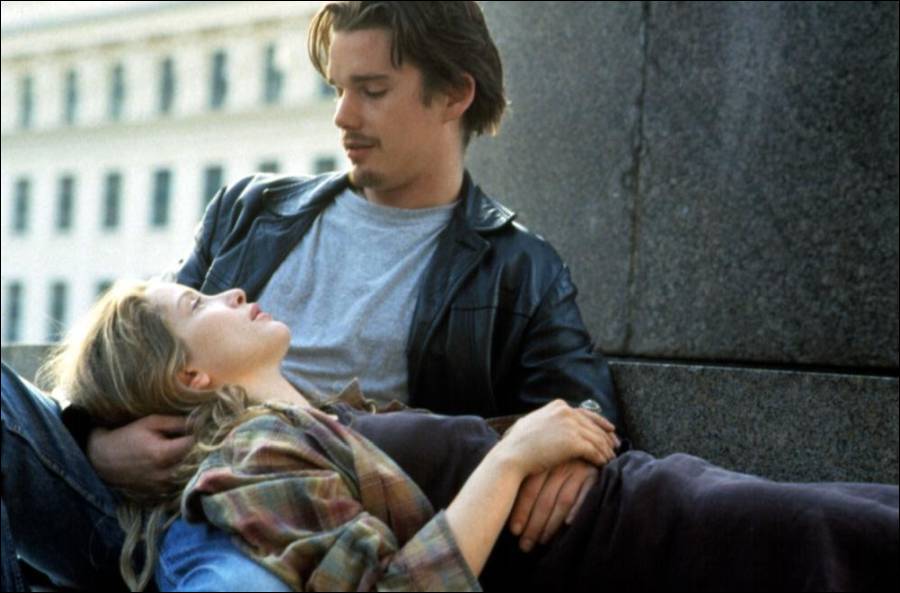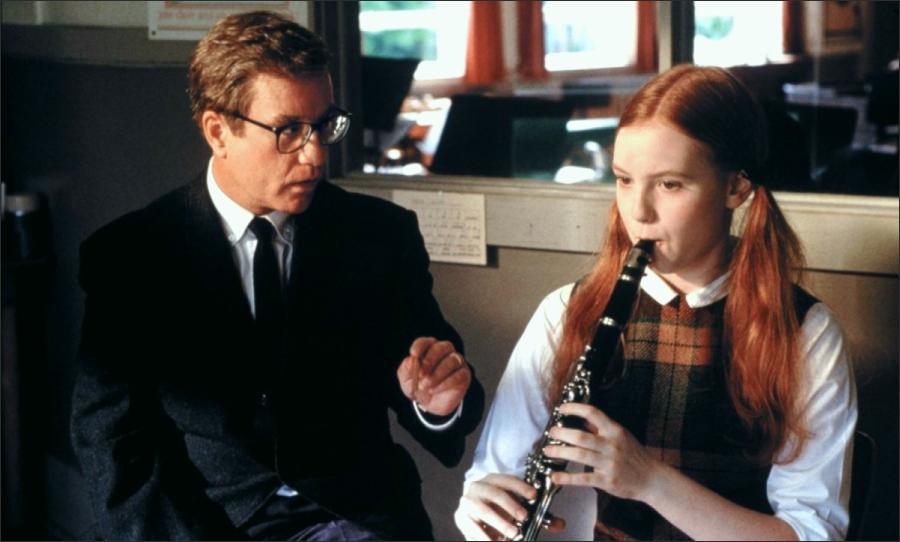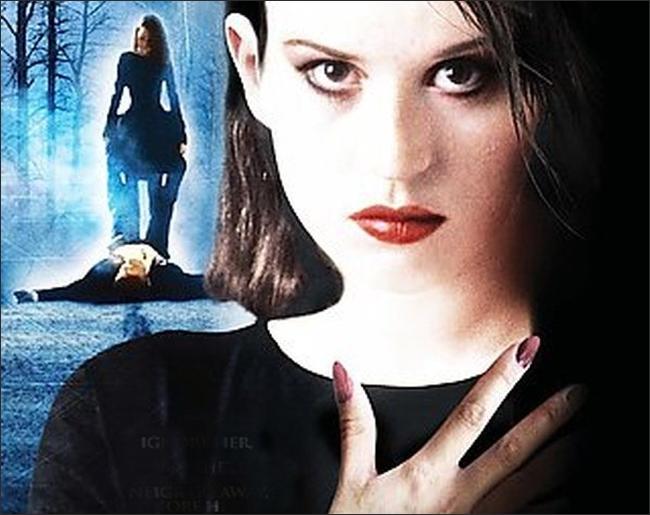Taglines: Triumphant in victory, bitter in defeat. He changed the world, but lost a nation.
Nixon movie storyline. Director Oliver Stone’s exploration of former president Richard Nixon’s strict Quaker upbringing, his nascent political strivings in law school, and his strangely self-effacing courtship of his wife, Pat. The contradictions in his character are revealed early, in the vicious campaign against Helen Gahagan Douglas and the oddly masochistic Checkers speech. His defeat at the hands of the hated and envied John F. Kennedy in the 1960 presidential election,
followed by the loss of the 1962 California gubernatorial race, seem to signal the end of his career. Yet, although wholly lacking in charisma, Nixon remains a brilliant political operator, seizing the opportunity provided by the backlash against the antiwar movement to take the presidency in 1968. It is only when safely in office, running far ahead in the polls for the 1972 presidential election, that his growing paranoia comes to full flower, triggering the Watergate scandal.
Nixon is a 1995 American biographical film directed by Oliver Stone for Cinergi Pictures that tells the story of the political and personal life of former U.S. President Richard Nixon, played by Anthony Hopkins. The film portrays Nixon as a complex and, in many respects, admirable, though deeply flawed, person. Nixon begins with a disclaimer that the film is “an attempt to understand the truth […] based on numerous public sources and on an incomplete historical record.”
The cast includes Anthony Hopkins, Joan Allen, Annabeth Gish, Marley Shelton, Powers Boothe, J. T. Walsh, E. G. Marshall, James Woods, Paul Sorvino, Bob Hoskins, Larry Hagman, and David Hyde Pierce, plus cameos by Ed Harris, Joanna Going, and political figures such as President Bill Clinton in TV footage from the Nixon funeral service.
The film didn’t perform well at box office, but became a critical success and was nominated for four Academy Awards: Best Actor (Anthony Hopkins), Best Supporting Actress (Joan Allen), Best Original Score (John Williams) and Best Original Screenplay. This was Stone’s second of three films about the American presidency, made four years after JFK, about the assassination of John F. Kennedy, and followed thirteen years later by W., the story of George W. Bush.
Behind the Camera
The film began shooting on May 1, 1995 but there was a week of pre-shooting at the end of April to film scenes that would be used as part of a mock documentary about Nixon’s career. Early on during principal photography, Hopkins was intimidated by the amount of dialogue he had to learn, that was being added and changed all the time as he recalled, “There were moments when I wanted to get out, when I wanted to just do a nice Knots Landing or something.”
Sorvino told him that his accent was all wrong. Sorvino claims he told Hopkins that he thought “there was room for improvement” and that he would be willing to help him. Woods says that Sorvino told Hopkins that he was “doing the whole thing wrong” and that he was an “expert” who could help him. Woods recalls that Sorvino took Hopkins to lunch and then he quit that afternoon. Hopkins told Stone that he wanted to quit the production but the director managed to convince him to stay. According to the actors, this was all good-natured joking. Woods said, “I’d always tell him how great he was in Psycho. I’d call him Lady Perkins all the time instead of Sir Anthony Hopkins.”
In Spring of 1994, Time magazine reported that an early draft of the screenplay linked Nixon to the assassination of President John F. Kennedy. The facts contained in the script were based on research from various sources, including documents, transcripts and hours of footage from the Nixon White House. Dean said about the film’s accuracy: “In the larger picture, it reflected accurately what happened.”
Stone addressed the criticism of fictional material in the film, saying, “The material we invented was not done haphazardly or whimsically, it was based on research and interpretation.” John Taylor, head of the Nixon Presidential Library, leaked a copy of the script to Richard Helms, former Director of the CIA, who threatened to sue the production.[2] In response, Stone cut out all scenes with Helms from the theatrical print and claimed that he did for “artistic reasons” only to reinstate this footage on the home video release.
Nixon (1995)
Directed by: Oliver Stone
Starring: Anthony Hopkins, Joan Allen, Powers Boothe, Ed Harris, Bob Hoskins, David Paymer, David Hyde Pierce, Paul Sorvino, Mary Steenburgen, James Woods
Screenplay by: Stephen J. Rivele, Christopher Wilkinson, Oliver Stone
Production Design by: Victor Kempster
Cinematography by: Robert Richardson
Film Editing by: Hank Corwin, Brian Berdan
Costume Design by: Richard Hornung
Set Decoration by: Merideth Boswell
Art Direction by: Richard F. Mays, Donald B. Woodruff, Margery Zweizig
Music by: John Williams
MPAA Rating: R for language.
Distributed by: Buena Vista Pictures
Release Date: December 22, 1995
Hits: 121
